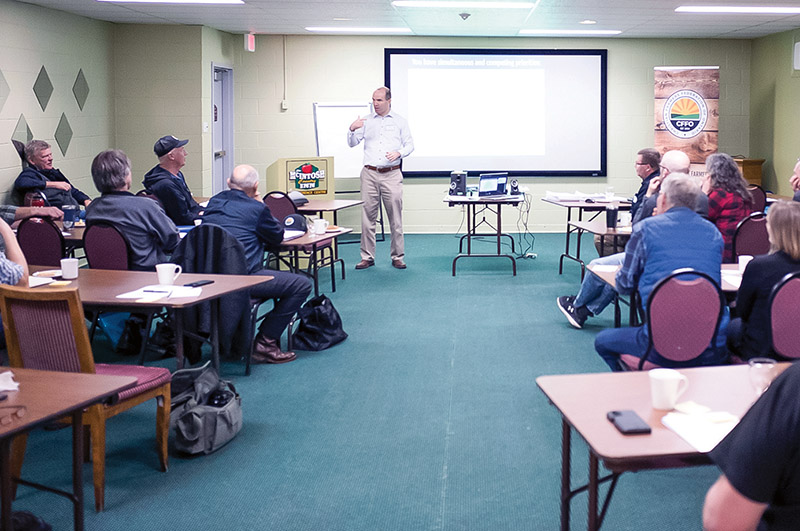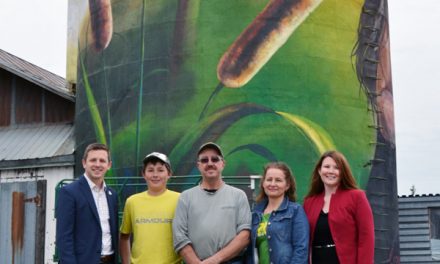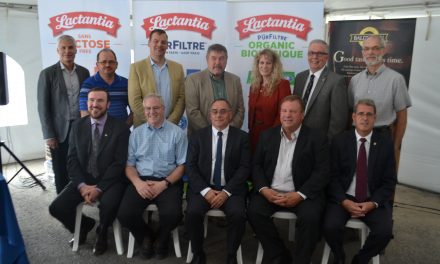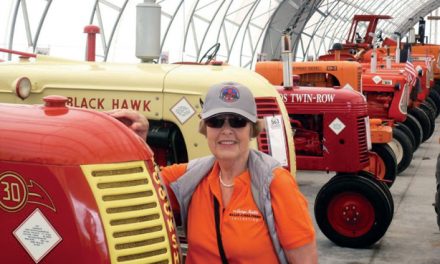Ian Cubitt, a professional business transition coach, was the guest speaker at the 2024 CFFO AGM held on Fri., Feb. 16 at the McIntosh Inn in Morrisburg. Tinkess Photo
By Terry Tinkess
AgriNews Staff Writer
The Christian Farmers Federation of Ontario (CFFO) has 21 districts, each of which hold their own AGM every year to vote for local representatives, contribute their input to the grassroots decisions that affect everyone in the agriculture industry, and share a bit of fellowship with others who share a common path.
The St. Lawrence-Ottawa Valley branch held their AGM at the McIntosh Inn in Morrisburg, Ontario on Fri., Feb. 16.
Each year a particular topic is selected in addition to local issues, and information, usually provided by a guest speaker, is provided to members. This year, attention focused on the idea of farm succession planning. The guest speaker was business transition coach Ian Cubitt, who was introduced by Paul Bootsma, CFFO member relations manager.
“Ian has his Chartered Professional Accountant designation,” said Bootsma. “He worked as an income tax specialist for over 10 years with Price Waterhouse Coopers and BDO Chartered Accountants. The last eight years he has focused his work on business transition coaching. He has coached hundreds of people in their farm transitions, and business transitions. Ian has worked on farm transitions ranging from modest size to operational [that] was over $100 million.”
When he arrived to speak to the St. Lawrence-Ottawa Valley branch, Cubitt had already spoken to 10 other branches about this very important issue. The need for an open and informed conversation about succession planning has become apparent as the baby boomer generation within the farming community looks toward some form of retirement while still hoping to keep their farms operational for the next generation.
The CFFO conducted an extensive survey on this topic in the fall of 2023, seeking valuable insights from its members. The anonymous survey revealed that many members are in the early stages of succession planning, with a common concern being how to ensure fairness, especially when many of their children have occupations off the farm or lack interest in farming compared to someone who is eager to carry on the agricultural legacy.
Cubitts’ presentations during the eastern Ontario AGM provided an understanding of how many issues exist in the financial, relational, and logistical challenges that typically form a part of farm succession planning. Through discussion and several simple, yet informative exercises, attendees were shown how easily things can go off-course when two or more people are involved in the same conversation yet come away with completely different interpretations of what was said. Here’s an example:
Let’s say you’re somehow working in business together, and you say to the to the other person, “Would you be willing to take responsibility for planting the beans in the spring?” Let’s say you’re willing to do that, you’re willing to take responsibility. So, you elaborate and ask, “Will you take responsibility to plant the beans in the spring?”
These are two different things. Being willing to do something and accepting responsibility to do it can be two different things.
Have we achieved mutual understanding on what the other person agreed to do? No, you have not. You may think you have, but there is much more to it. Clarification is required.
“What you actually meant was, when it’s time to plant, I will tell you, and you need to drive the tractor,” said Cubitt. “That’s what you meant. What the other person was thinking was, ‘finally, I get to pick whether I do IP Roundup Ready or whatever the technical term is now. ‘I get to choose whether it’s pre-emergent or post-emergent. I’m deciding whether we’re doing no till or tillage. I’m deciding on the chemical program. I’m deciding on the fertilizer program.’
“We’ve talked about this, he’s agreed to it, and we’ve misunderstood each other. We’ve communicated, but communication is overrated. Mutual understanding takes far more work and far more emotional intelligence.”
You may end up with the same understanding, but there are many more small decisions that need to be made, and understood, before you can get to that point.
It’s a big step, but one that is inevitable at some point, and as Cubitt explained, one day you will be done. Either you choose, or time chooses, and if you want the best chance for a positive outcome, it needs to be you.












